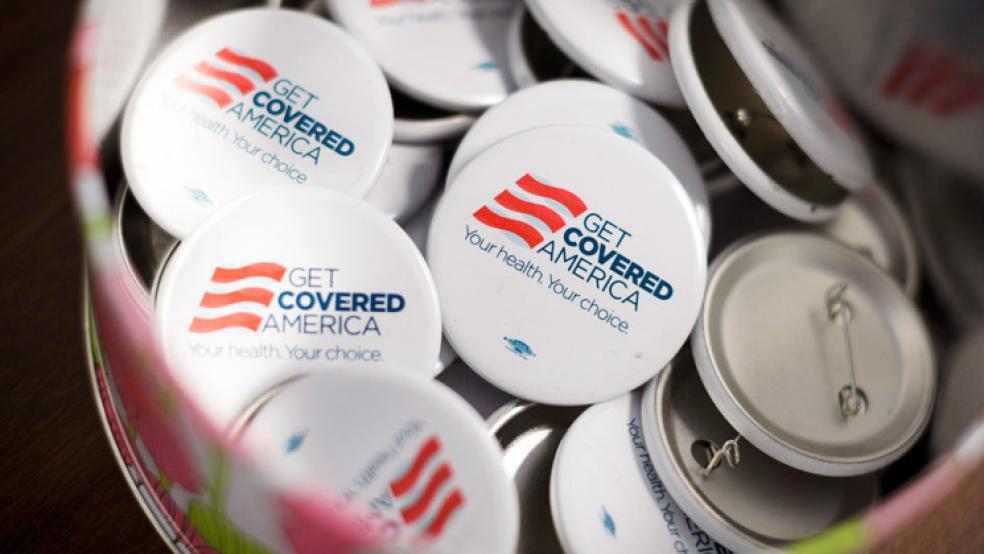Obamacare suffered a setback from the Supreme Court last week that may have seriously undermined the administration’s efforts to provide women with free access to FDA-approved birth control devices
The high court ruled in Burwell vs. Hobby Lobby that family-owned businesses could choose not to provide birth control to employees if it offended the owners’ religious beliefs.
Related: SCOTUS Hobby Lobby Ruling Chips Away at Obamacare
Now, a bigger and more fundamental problem may lie ahead for Obamacare. As early as this week, a D.C. appellate court could rule against the administration on the most basic question: Are the massive premium subsidies flowing to low-income people through the federal insurance exchanges legal, or should that money be cut off?
A three-judge panel of the U.S. Court of Appeals is expected to rule on a suit claiming that only those who signed up for coverage through the 14 state insurance marketplaces are entitled to subsidies. The suit, Halbig vs. Burwell, argues that the subsidies can’t be provided to people in states that signed up for the federal exchange.
The impact could be huge: Only 14 states set up their own insurance marketplaces, while 36 others opted to let the federal government create and operate their exchanges. If the subsidies are ruled illegal for the federal exchanges, that could torpedo the Affordable Care Act by making insurance unaffordable for millions of people relying on the subsidies to lower the cost of their premiums.
Related: Big Increases in Obamacare Premiums and Deductibles Coming in November
In essence, after years of conflict over the controversial health care law, the courts could end up doing what congressional Republicans have repeatedly tried and failed to do: Dismantle Obamacare.
Roughly 8 million people signed up for Obamacare through the state and federal exchanges in the first six-month enrollment period, which ended this spring. Eighty-seven percent of those who signed up for insurance in the federal exchanges received subsidies – or about 5.4 million people, according to analyses.
Ron Pollack, executive director of Families USA and a major booster of Obamacare, has been widely quoted as calling the legal challenge to the subsidies “the greatest existential threat” to the survival of the Affordable Care Act.
In an email on Sunday, Pollack said that without the subsidies, “The vast majority would be unable to afford the premiums and would re-join or join the ranks of the uninsured.”
Related: CBO Quietly Drops Forecast That Obamacare Will Cut the Deficit
He added, “The loss of the subsidies would make it very difficult to enroll additional low- to moderate-income people in coverage – largely because affordability is the key issue for people when they consider whether or not to enroll in coverage.”
The legal argument, at its root, is over what Congress intended when it wrote the health law back in 2010.
Four cases, including Halbig vs. Burwell, have been brought by employers and individuals in various courts. The cases are challenging the government’s contention that Congress wanted individuals in both state and federally operated exchanges to qualify for subsidies.
On March 25, a three-judge panel of the D.C. Circuit heard oral arguments in the Halbig case. Another panel in the Fourth Circuit Court of Appeals in Richmond, Virginia, heard arguments in a similar case, King vs. Burwell, on May 14. (Burwell refers to the new Health and Human Services Secretary, Sylvia Mathews Burwell.)
Related: CBO Says Obamacare Will Cost Less Than Projected
Michael Cannon of the Cato Institute and Jonathan Adler of Case Western Reserve University contend in a recent analysis in Health Affairs that statutory eligibility rules for the ACA’s premium-assistance tax credits “clearly say” that eligibility “depends on the applicant being enrolled in a qualified health plan ‘through an Exchange established by the State.’”
“The rules employ that restrictive phrase nine times, without deviation,” the two scholars write. “Since the Act explicitly ties its cost-sharing subsidies, employer-mandate penalties, and (in many cases) individual-mandate penalties to the availability of these tax credits, it therefore also authorizes those provisions only in states that establish Exchanges.”
They added, “This condition was not a fluke or a drafting error.”
Pollack of Families USA fired back in his email: “There never was an intention to distinguish between state-run market places and federally facilitated market states in the provision of premium subsidies.
“The purpose of the ACA was to extend health coverage – and, hence, subsidies – to families in all states,” he added. “The specious theory that Congress established conditionality for subsidies to induce states to run their own marketplaces was never discussed at all during the legislative process and was conjured up by the creative plaintiffs months later.”
How the two appellate courts in D.C. and Richmond rule and the immediate and long-term implications are murky for now. Cannon said in an interview Sunday that the Richmond panel likely would vote against the plaintiffs, while there is a far greater possibility the D.C. panel will vote against the Obama administration. If that happens, the government would likely ask the entire appellate court to rule, and if need be take the matter all the way to the Supreme Court – a process that could take another year to conclude.
Either way, there is little doubt the fate of the subsidies is very much up in the air.
George Washington University legal scholar Jonathan Turley wrote recently in The Los Angeles Times: “If Hobby Lobby will create complications for Obamacare, Halbig vs. Burwell could trigger a full cardiac arrest.”





